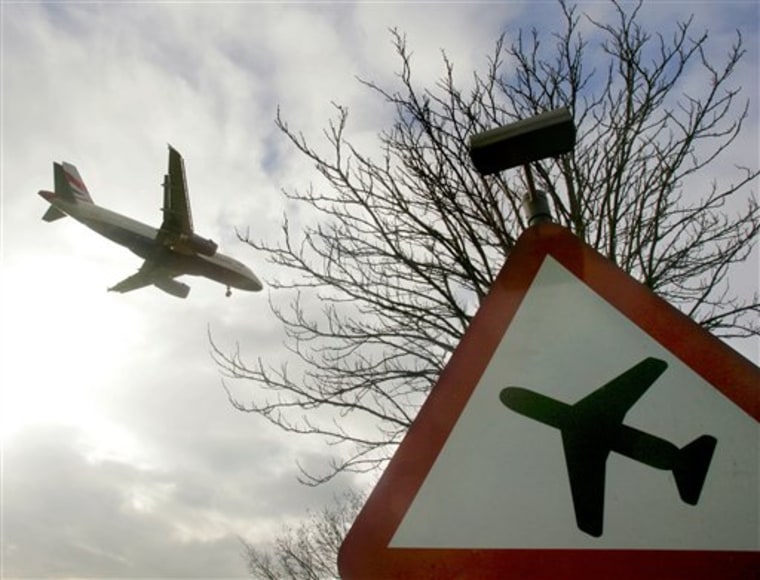Starting this weekend, travelers on both sides of the Atlantic will find they have more options when booking nonstop flights between the U.S. and Europe.
They could fly between New York, and Lyon, France, or find a new flight from Salt Lake City to Paris.
What they won't find much of when the Open Skies agreement between the U.S. and European Union kicks in on Sunday are lower fares, despite a handful of introductory sales.
That's because airlines already struggling with sky-high fuel prices and an economic slowdown see Open Skies' relaxed route restrictions primarily as a way to attract more of the high-end business and affluent leisure travelers they covet and see as necessary to their financial survival. British Airways, for instance, is launching a new trans-Atlantic airline to take advantage of the agreement — aptly named OpenSkies — but will offer only 30 economy-class seats on each 82-seat plane, with the rest evenly split between first and business class.
"There is a move afoot ... to use smaller (airplanes) flown nonstop to push leisure customers by the wayside ... except for those willing to pay far higher prices," said Robert Mann, an independent airline consultant in Port Washington, N.Y.
As oil has pushed past $100 a barrel, propelling jet fuel prices to record levels, many carriers have cut domestic capacity and moved planes to international routes, where ticket prices —and profits — are higher. The Open Skies agreement appears likely to hasten the shift.
While the number of overall flights may increase and some cities will get new service and routes, the vast majority of the new flights will be on the same well-trafficked routes.
"There simply are not any large number of under- or non-served markets between the U.S. and the EU," said Mike Boyd, president of The Boyd Group, an Evergreen, Colo., airline consulting firm. "Virtually every nonstop market between points in the U.S. and Europe that can support service already has service."
There will be some instances where flights shifted from existing routes to new ones to Europe may push fares lower in the short term. But that will be balanced by fewer flights and less competition on other routes, Mann said. Still, popular destinations like London could see more competition, and some lower fares.
The Open Skies agreement was inked last May to end rules under which U.S. and European governments had to negotiate airlines' access to new markets, often on a city-by-city basis. The restrictions were perhaps most in focus at London's Heathrow Airport, where only four airlines could offer service to the U.S.: British Airways PLC, Virgin Atlantic Airways, UAL Corp. unit United Airlines and AMR Corp. unit American Airlines.
Heathrow will also benefit from a new British Airways terminal, which will create more room for new flights at existing terminals by other carriers — Continental Airlines Inc., Delta Air Lines Inc., Northwest Airlines Corp. and US Airways Group Inc. — who are eager to offer service to one of the world's busiest international hubs.
The old rules also prevented European carriers from offering nonstop service to the U.S. from another European country. For instance, Air France was prohibited from flying direct to the U.S. from London — any U.S.-bound Air France flight had to stop in France first.
New routes that will be launched under Open Skies include:
- British Airways' OpenSkies flights from Brussels and Paris to New York.
- Delta Air Lines Inc. service to Heathrow from New York's John F. Kennedy International Airport and Atlanta; to Lyon, France, from JFK and to Paris from Salt Lake City and JFK.
- Continental Airlines Inc. service to Heathrow from Newark Liberty International Airport and from Houston George Bush Intercontinental Airport.
- Northwest Airlines Corp. flights to Heathrow from Detroit, Minneapolis and Seattle.
- Air France-KLM service from Heathrow to Los Angeles.
- US Airways service between Heathrow and Philadelphia.
- A United flight to Heathrow from Denver.
- American will shift flights from Dallas and Raleigh, N.C., to Heathrow from London's Gatwick Airport.
Open Skies may offer travelers more in the way of convenience than savings, but it is likely to help the airlines' bottom lines. Carriers say Open Skies' biggest benefit is giving them the freedom to quickly make changes to their flight schedules. Many airlines will also launch new code-sharing agreements — which let them book passengers on one another's planes.
"Liberalization of the trans-Atlantic market allows us to pursue growth opportunities where and when they make commercial sense with less government interference," said John Tague, United's chief revenue officer.
